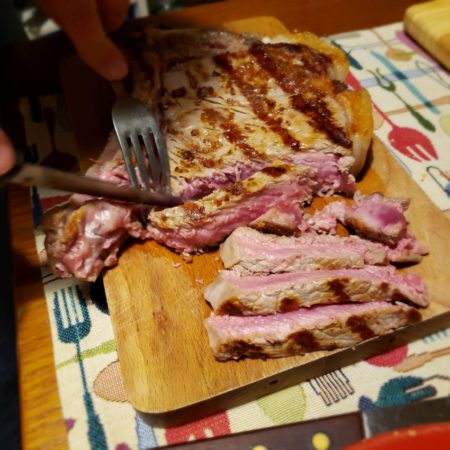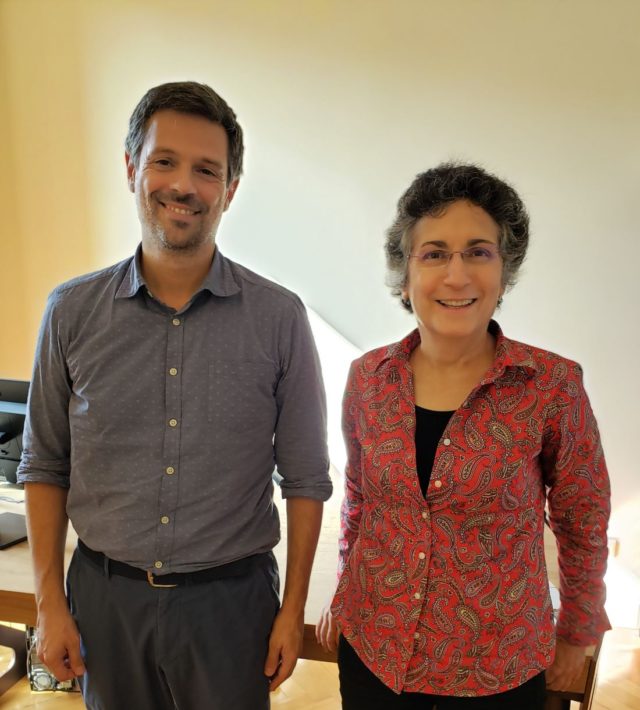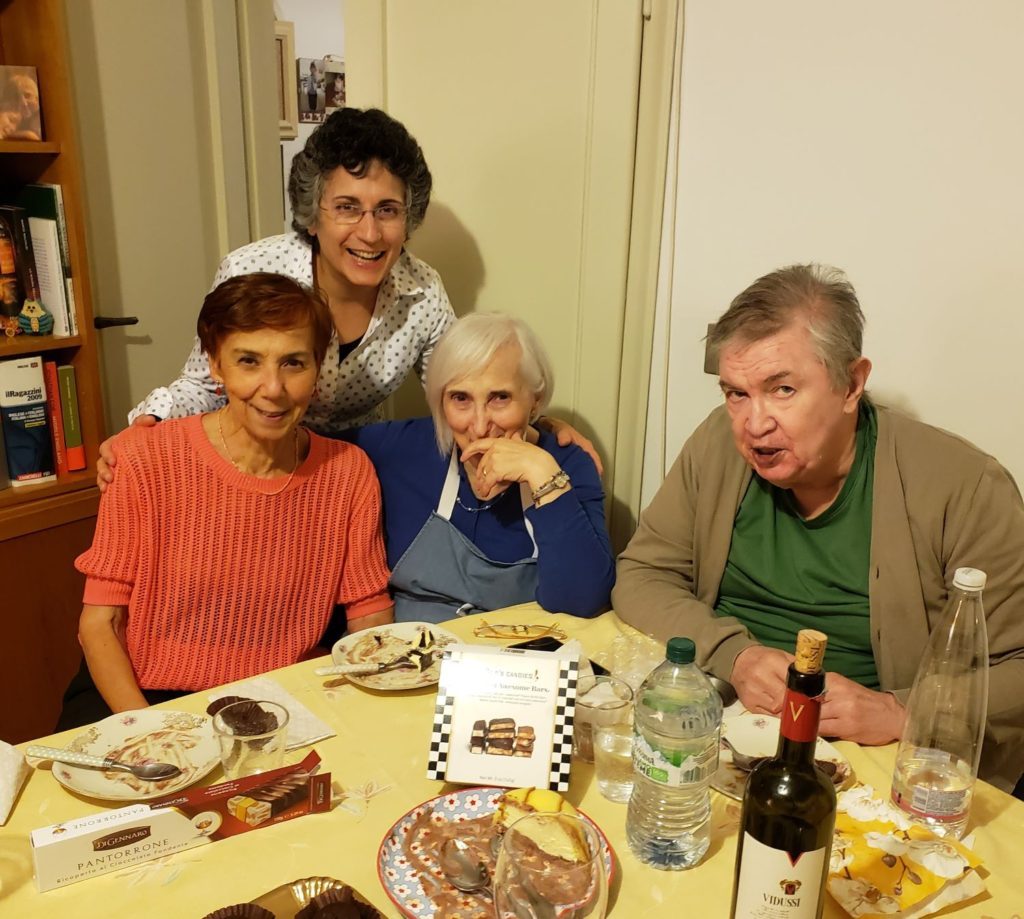While the U.S. recognizes National Family Caregivers Month and millions of family caregivers in the U.S. serve lovingly and with great sacrifice, I extend our recognition a quarter way around the Earth to welcome family caregiver, Mauretta Bernardini in Italy!
I met Mauretta Bernardini last month while in Florence. She and her husband retired six years ago. Like the rest of us, they had plans to enjoy their retirement after working decades and raising a son. But as former Beatles, John Lennon wrote, “Life is what happens while you are busy making other plans,” Mauretta’s beloved Welsh hubby, Geoffrey, began showing signs of cognitive loss with Parkinson’s symptoms.
Mauretta wrote:
A few weeks before my retirement, my husband started showing signs of serious neurological problems combined with cognitive loss. He was in hospital for a long time and when he came home, he was soon totally dependent on me.
A sense of heavy sadness filled my heart, my dream of spending time together to enjoy life with our three precious grandchildren, suddenly wiped out.
In spite of my sad feelings, I had to quickly get down to learning my new profession as a caregiver. I had to spend time learning about his medical conditions, his medications and how to administer them. All that was learnt, but I realized soon how difficult it was to find time for myself, so I started planning my days carefully leaving some vital time for my personal health and spirit. As I used to plan my weekly classes, I know have two ‘Action Plans’ for the week, one for my husband and one for myself.
Mauretta’s Next Life Chapter—Caregiver
And so, began the next chapter of her life—caregiver.
Somewhere among the pages of her life’s new chapter, she signed up for The Caregiver’s Voice Monthly Newsletter. In the August issue, I wrote: If you live in Italy or have family in Milan, Tuscany, or Rome, send me an email. My plan is to spontaneously experience Italy via its people, food, sites, and countryside.
She did!
Over the weeks, we strengthened our relationship. Fortunately for me, she taught English and we were able to communicate easily by email and telephone. She’d exclaim, “Brenda, you’re giving me a lot of homework!” I laughed considering she was a teacher used to giving others homework.
Mauretta took initial tentative steps to help this American find a place to stay and rent a car. Both were challenging as she had to redirect her time and energy beyond caregiving. Also, Mauretta never learned to drive. She had no idea how to answer the rental car representative’s questions regarding what kind of car to reserve for me.
Further proof that caregivers are a special breed of people, she put in hours of effort and came through wonderfully with help from her friends and former students. I stayed in one of the finest and luxurious hotels during my two-weeks traveling to Rome, Milan, Florence, and the Tuscan countryside and drove a peppy hybrid Volkswagen Golf.
As I wrote in the August newsletter, my goal was to connect with people over food or while wine tasting. I also wanted to enjoy the sights. With Mauretta all of these goals became my reality.
An Exquisite Dinner Among New Friends
Instead of eating out—her husband prefers staying at home—we ate in.
I had read about the famous steaks in Florence from a centuries old breed of cow. I wanted to try one of these famous thick-cut steaks. But the portions are 1 kilo at 2.2 pounds. I would only be able to eat 10% of that steak!
Instead of spending €60 ($64) for one of these steaks at a restaurant, we went to Mauretta’s neighborhood butcher. He is one of those old-time butchers I remember from my youth. He trimmed two steaks neatly before weighing them. Mauretta asked and he obliged with a detailed explanation of how to prepare the steak. And, this being Italy, at my request, he recommended a wine (produced by his cousin), which was a perfect match to the steak.
Five of us enjoyed an exquisite dinner learning more about one another amid laughter. And Mauretta made it extra special with a side dish of pasta mixed with Italy’s famous truffles and a sinful assortment of desserts.
While her husband Geoffrey’s hands were occasionally unsteady, he relaxed at times and five of us enjoyed gourmet dining while deepening our friendship—truly, a delightful evening.
Continued from above, Mauretta wrote:
I love walking, meeting friends, cooking, knitting, reading, doing volunteer work. Not enough time to include everything, but I try to include some of them in my week. And when in the middle of the chores of your busy day you find time to welcome friends from California, cook dinner for them, spend time with them visiting the city, you feel especially lucky and grateful.
Awwwww, how sweet. Thank YOU again, Mauretta!
Sometimes, enjoying the company of people without caregiving being front and center is needed for self-care.
Finally, I tasted wines at Vallone di Cecione, an award-winning family-run winery in the small Tuscan countryside town of Panzano with wine master Francesco Anichini, one of Mauretta’s former students.
Mario Possenti, Secretary General of Federazione Alzheimer Italia
Prior to meeting Mauretta, I had the pleasure of meeting with Mario Possenti, Secretary General of Federazione Alzheimer Italia. Since I would be in Milan, I wanted to learn from him the successes and challenges of Alzheimer’s and caregiving in Italy. As a board member of Alzheimer’s Europe, he was kind enough to meet with me a day before he was scheduled to depart for Helsinki.
Thank you, Paola Barbarino, CEO of Alzheimer’s Disease International for your office’s help with an introduction.
An estimated 1.4 million people live with dementia in Italy. Fifty dementia friendly communities serve them within inclusive environments.
 Italy’s strength is a strong family network as a basis to build communities. In fact, one novel approach is building engagement among the youth. High school students participate in online training (delivered via three one-hour sessions). They will grow up more informed and know how to help, later.
Italy’s strength is a strong family network as a basis to build communities. In fact, one novel approach is building engagement among the youth. High school students participate in online training (delivered via three one-hour sessions). They will grow up more informed and know how to help, later.
These strengths are counter-balanced with several challenges. Primary among them is for the past two decades, Italy has about 20 diverse health care systems. Each approaches care and treatments differently. Each also has varying degrees of resources. This makes it more difficult for the Federazione Alzheimer Italia to offer a more standardized approach through their 47 chapters that serve the nation.
Additional challenges include the six months it often takes for a person to receive their initial assessment. Because of this and possibly the stigma that follows one diagnosed with dementia, many in Italy are diagnosed at a later stage of dementia. Meanwhile, the world prioritizes early diagnoses in order to start treatments earlier to delay progression of the disease, since there is not yet a cure for dementia. Secretary Possenti is also concerned about the false hope that the media hype leads families to believe that there is a cure.
Mario Possenti has been an Alzheimer’s and dementia advocate since 2004. Today, he remains a youthful forty-something advocate with an easy-going manner. I hope he has the strength to continue to serve people like caregiver Mauretta and her husband, Geoffrey, who will need more help as his disease progresses.
Publisher: Source link




